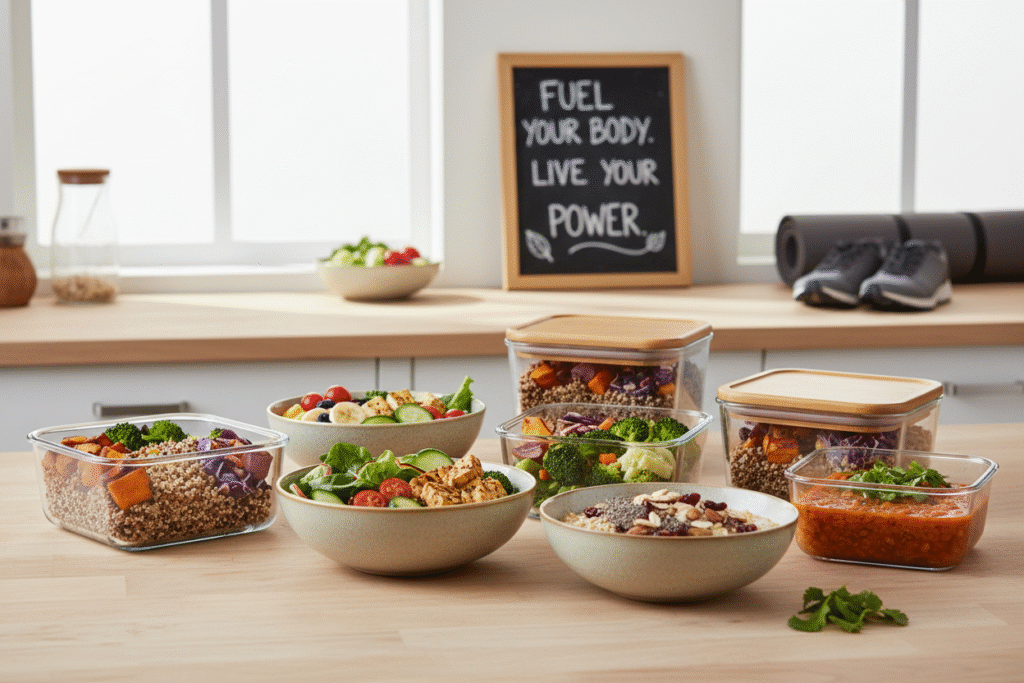In today’s fast-paced world, maintaining optimal health and fitness can feel like a challenge. Between work, family, and daily responsibilities, it’s easy to overlook nutrition—the cornerstone of energy, performance, and overall well-being. One solution gaining tremendous popularity is the plant-based diet. Not only does it fuel your body with essential nutrients, but it also supports long-term fitness goals and boosts energy levels naturally.
Whether you’re an athlete, a busy professional, or someone looking to improve overall health, a plant-based diet can be a game-changer. In this guide, we’ll explore how plant-based eating contributes to health, fitness, and nutrition, along with practical tips to incorporate it into your daily routine.
Why a Plant-Based Diet Supports Health and Fitness
1. Natural Energy Boost for Workouts
Plant-based foods are packed with complex carbohydrates, fiber, and healthy fats that provide sustained energy. Unlike processed foods, which can cause spikes and crashes in blood sugar, nutrient-dense plant foods like quinoa, oats, lentils, and leafy greens help maintain stable energy levels throughout the day.
Whether you’re hitting the gym, going for a run, or doing a home workout, fueling your body with plants ensures your muscles have the energy they need to perform efficiently and recover faster.
2. Supports Muscle Recovery and Growth
Many people assume plant-based diets lack adequate protein, but with careful planning, you can meet your protein requirements entirely from plants. Sources like beans, lentils, tofu, tempeh, edamame, nuts, and seeds provide essential amino acids. Combining different plant proteins throughout the day ensures complete protein intake, which is vital for muscle repair, growth, and recovery after exercise.
3. Promotes Heart Health and Weight Management
A plant-based diet is naturally low in saturated fat and cholesterol, which can help reduce the risk of heart disease. At the same time, the high fiber content promotes satiety, reduces overeating, and supports healthy weight management. For anyone aiming to improve overall fitness, managing weight and cardiovascular health is crucial.
4. Reduces Inflammation and Supports Joint Health
Chronic inflammation can hinder workouts, recovery, and overall mobility. Many plant foods—especially berries, leafy greens, nuts, seeds, and colorful vegetables—contain antioxidants and anti-inflammatory compounds that support joint health and reduce soreness after physical activity.

How to Plan a Plant-Based Diet for Optimal Fitness
Balanced Meals for Energy
A successful plant-based diet emphasizes variety. Include foods from different groups to ensure your body gets a full spectrum of nutrients:
- Proteins: Lentils, chickpeas, tofu, tempeh, edamame, quinoa
- Carbohydrates: Brown rice, sweet potatoes, oats, whole grains, fruits
- Healthy Fats: Avocado, nuts, seeds, olive oil
- Vegetables: Leafy greens, cruciferous vegetables, colorful peppers, carrots
- Hydration: Water, coconut water, herbal teas
Sample Daily Plan
- Breakfast: Oatmeal with almond butter, chia seeds, and berries
- Snack: Apple slices with peanut butter
- Lunch: Quinoa salad with chickpeas, spinach, cherry tomatoes, and tahini dressing
- Snack: Roasted edamame or mixed nuts
- Dinner: Lentil and vegetable stir-fry with brown rice
Consistency is key. Gradually introduce more plant-based meals and monitor your energy levels and performance.

Tips to Combine Plant-Based Nutrition and Fitness
- Pre-Workout Fuel: Eat a small, carb-rich meal 1–2 hours before exercise to boost energy. Example: banana with peanut butter or whole-grain toast with avocado.
- Post-Workout Recovery: Include protein-rich plant foods to support muscle repair, such as a smoothie with tofu, almond milk, and berries.
- Supplements if Needed: Vitamin B12, Vitamin D, Omega-3 (from algae), and iron may be necessary depending on your diet.
- Listen to Your Body: Adjust portions and food types based on energy, performance, and recovery needs.

Conclusion
A plant-based diet is more than just a trend—it’s a lifestyle choice that can profoundly impact your health, fitness, and nutrition. By fueling your body with nutrient-rich plant foods, you can boost energy, enhance workouts, support muscle recovery, and maintain overall wellness.
Start small, experiment with recipes, and focus on balance. Over time, a plant-powered approach can help you achieve better performance, sustained energy, and a healthier life.
Call to Action:
Transform your fitness journey with a plant-based diet today. Fuel your body, energize your workouts, and embrace a healthier, stronger you!

